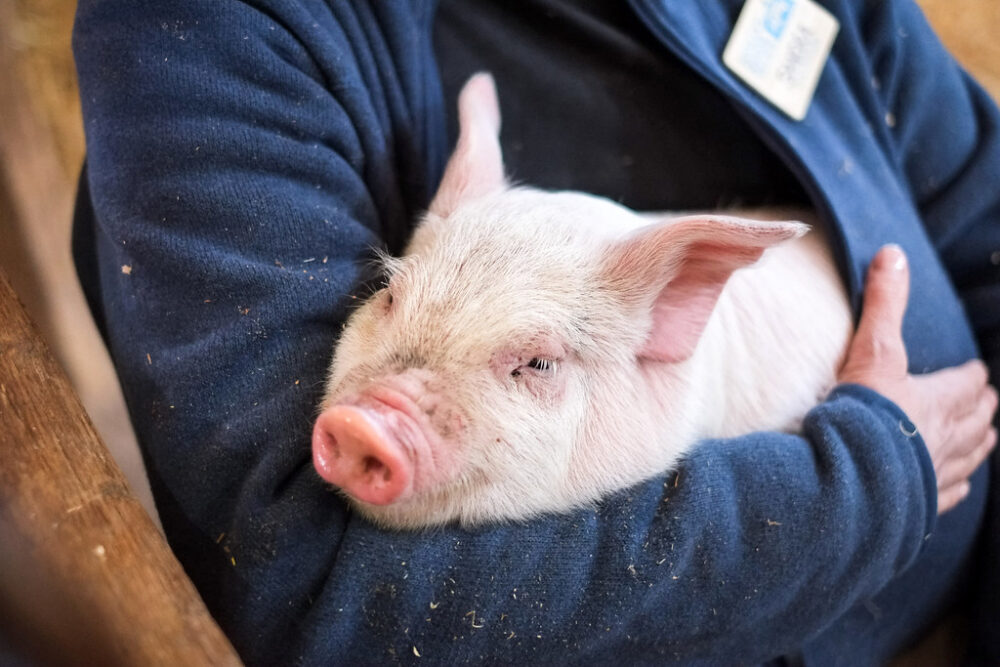91,099. That was the number of people needing a kidney transplant in 2020. Of those people, just one in four received the coveted organ. The others will have to wait an average of four to five years. Kidney transplants are in such high demand that they make up 83 percent of all organ transplant needs. With so few donors, researchers are turning to possible non-human sources.
On Oct. 19, 2021, a surgical team led by Robert Montgomery at the New York University Langone Transplant Institute successfully performed the first xenotransplantation using a pig kidney. This was a monumental step in solving the kidney transplant shortage, as researchers look to source kidneys from pigs. The idea of xenotransplantation is not new: heart valves, skin grafts, pancreatic cells, and insulin have already been derived from pigs and other animals for use in humans. However, the successful transplant of a complete organ that is so vital to the body is a massive breakthrough in medicine. For kidneys in particular, pigs are the ideal animal as their kidneys are remarkably anatomically similar to human kidneys. Pigs produce many offspring, meaning there will not be a shortage of organs in the future. Furthermore, pigs have a short gestation period and are easy to raise and control, making them efficient for providing kidneys.
The idea of xenotransplantation is not new: heart valves, skin grafts, pancreatic cells, and insulin have already been derived from pigs and other animals for use in humans.
The main issue with using pig organs is that pig tissue contains a sugar, alpha-gal, which is targeted by the human immune system and can cause instant organ rejection. To sidestep this problem, the transplant team used a kidney from a genetically-modified pig that lacked alpha-gal. These pigs, dubbed gal-safe pigs, were approved by the FDA for consumption and medicinal uses in December 2020.
On Oct. 19, 2021, a surgical team led by Robert Montgomery at the New York University Langone Transplant Institute successfully performed the first xenotransplantation using a pig kidney.
The Gal-safe kidney was transplanted into a clinically brain-dead woman whose family consented to the experiment. Dr. Montgomery and his team attached the pig kidney to blood vessels within the body and kept the kidney outside of the body within a protective shield to allow for real-time monitoring. Within minutes, the transplanted kidney was producing urine — a positive marker for renal function. Over the course of 54 hours, the kidney was continuously monitored. No signs of rejection were present. Instead, the kidney turned a vibrant pink color: a strong signal for healthy organs. Furthermore, the patient’s abnormal creatinine levels were restored to normal by the presence of the pig kidney. Abnormal creatinine levels indicate poor kidney function, meaning that the transplanted organ successfully restored kidney function. Most impressively, the urine and creatinine levels were equivalent to that of a human kidney transplant.
To further decrease the chance of organ rejection, Dr. Montgomery and his team also transplanted a Gal-safe thymus gland. This organ works to educate the human immune system on how to recognize the kidney as its own. Immunosuppressive drugs, a typical prescription for organ transplant patients, were administered alongside the thymus gland transplantation to reduce the chance of rejection.
Over the course of 54 hours, the kidney was continuously monitored. No signs of rejection were present.
While this experiment was certainly a strong step in the right direction for decreasing kidney transplant wait times, we are far from the widespread use of pig kidneys. The concept still needs much more testing for long-term effects and the possibility of rejection further down the line. Additionally, there are ethical and religious considerations. While some argue that using pig organs is justified for use in humans because pigs are already raised for food, others argue that just because we can does not mean we should. Additionally, People for the Ethical Treatment of Animals (PETA) is very against the idea of xenotransplantation, citing that animal lives come at the cost of human self-centeredness. Furthermore, religious deliberations must be taken into account.
Despite all these considerations, the xenotransplantation was approved by medical ethicists, legal experts, and religious experts on a special research ethics board at NYU Langone. Following the FDA approval of gal-safe pigs last year, the possibility of life-saving xenotransplantation is on the horizon. A concept seemingly straight out of a science fiction novel, gal-safe kidneys have the potential to heal those 91,099 people in need and might apply to other organ transplant needs in the future.
https://www.sciencenews.org/article/xenotransplantation-pig-human-kidney-transplant
https://www.nytimes.com/2021/10/19/health/kidney-transplant-pig-human.html
https://www.technologyreview.com/2021/10/20/1037752/pig-kidney-human-patient-xenotransplantation/
